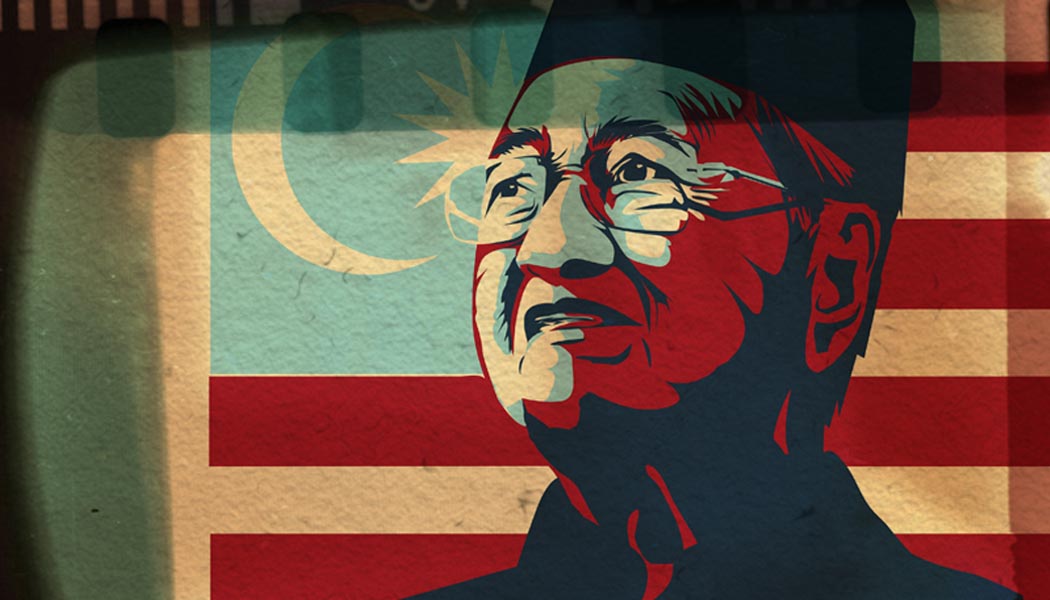Gava Fox hails schadenfreude and the age of the political, sporting and otherwise awesome comeback. Illustrations by Adi.

Comeback king: Mahathir Mohamad
GERMANS are often stereotyped as lacking a sense of humour, whereas in reality they gave us a word to articulate one of the great pleasures known to mankind – schadenfreude.
Literally translated as “damage joy”, schadenfreude is better described as the secret pleasure you get from seeing or learning of someone else’s misfortune.
Watching someone spill a tray of drinks after they cut the queue at a bar, that’s schadenfreude; seeing a fellow surfer wipe out spectacularly after they take your wave, that’s also schadenfreude.
But the concept stretches beyond that – especially when public figures turn out to have feet of clay.
American speculator Martin Shkreli caused outrage when in 2015 he bought the rights to a little-known but essential anti-parasite drug called Daraprim and immediately raised its price from $13.50 to $750 a pill, leading to him being referred to by the media as “the most hated man in America”, and “pharma-bro”.

Enemy No. 1: Martin Shkreli
The howls of outrage turned to cheers of joy last year after Shkreli was convicted of securities fraud and sentenced to seven years in jail. That too is schadenfreude.
But there is something that gives us even more pleasure than watching someone else’s misfortune, and that is a good redemption story.
The biblical fable of Lazarus may be the most famous comeback in history, but with almost every aspect of human life – from sport to politics, science to literature – there are tales aplenty of fallen heroes who have once again triumphed. Take Mahathir Mohamad, for example.
As Prime Minister of Malaysia from 1981 – 2003, he fended off numerous rivals and was widely credited with modernizing the country, turning it from a developing nation into a regional heavyweight.
His power, however, came at the expense of the legal system and human rights. He muffled critics, introduced laws that allowed for detention without trial, banned opposition parties and even jailed his own deputy, Anwar Ibrahim, on trumped-up sodomy charges.
Few people were sorry to see him go when he finally retired, even though he had handpicked a pliant successor, Najib Razak – a decision he would later rue as “the biggest mistake of my life”.

Out: Najib Razak.
Najib’s rule turned out to be a kleptocracy – his wife is said to have amassed over $1 million worth of handbags, making Imelda Marcos’ penchant for shoes seem modest – and he was ousted in May by the return to power of Mahathir at the ripe old age of 92.
One of Mahathir’s first acts was to release his old deputy Anwar from jail and secure for him a royal pardon. He has promised to stand down in favour of Anwar within 18 months … that is two comebacks for the price of one, with some schadenfreude thrown in for good measure.
The United States loves nothing more than a political comeback.

Marion Barry sucks on a crack pipe.
Marion Barry was forced from office as Mayor of Washington DC in 1991 after video emerged of him smoking crack. Four years and a jail sentence later, he was re-elected leader of the nation’s capital.
South Carolina Governor Mark Sanford, meanwhile, retired from politics after a scandalous affair in 2011. Two years later he was elected to the U.S House of Representatives.
Sport perhaps provides more comeback stories than any other field.
Close to home, there is the tale of Jason McCartney, the star North Melbourne Aussie Rules player who suffered burns to 50 percent of his body in the 2002 Bali bombings.
Eight months later, on his return to the sport, he kicked the winning goal in a match against Richmond, was chaired off the field by his team mates and promptly announced his retirement.
Niki Lauda too suffered horrendous burns, in a near-fatal Formula One crash in 1976, but returned the following year to win the world title. After retiring in 1979, he changed his mind in 1984 to win another championship, before quitting the sport again – for good this time.

Niki Lauder: back from the brink.
Despite winning three Grand Slam titles, Andre Agassi quit tennis in 1997 and went on a drug and alcohol binge, losing his hair and ballooning in weight.
With what would turn out to be the best return of his life, he got back in shape and by 2000 was again world number one, and he’d win six more Grand Slams before finally hanging up his racket.
One sporting redemption tale yet to be told is that of Tiger Woods, arguably the greatest golfer ever.
Despite his enormous success Woods was always an aloof figure, and while golf fans and the public at large may have admired his success, he was never loved.
In 2009 he fell from grace in spectacular fashion, chased out of his house by his golf club-wielding wife after she discovered a string of extra-marital affairs. A series of back operations saw him out of the game for nearly two years and he slumped to a world ranking of 899.
Although he hasn’t won since his return a few months ago, the old Tiger is back – albeit a softer more gentle version.
He now takes time to sign autographs for fans, he answers journalists’ questions after a round and, something rarely seen during his prime, can actually be seen smiling while he plays.

Tiger Woods: Can he be all that he once was?
Comebacks by movie stars are more rare – once your star fades, Hollywood tends to forget who you are – but that doesn’t mean actors haven’t had a chance to shine again.
John Travolta, one of the most bankable talents of the ’70s and ’80s with smash hits such as Grease and Saturday Night Fever, faded into obscurity until cast by Quentin Tarantino’s hit Pulp Fiction.
Mickey Rourke was a leading man in movies such as Barfly and Angel Heart until suffering a major career slump during which he underwent a series of disastrous plastic surgery procedures.
Redemption for the washed-up actor came when he played the part of a washed-up fighter in The Wrestler, earning a Golden Globe and Oscar nomination.

Robert Downey Jnr, perhaps, came back from further than anyone else.
After an award-winning turn as Chaplin, he was jailed three times for drug and alcohol offences, but after an obligatory tearful turn on the couch of Oprah Winfrey he turned his life around, and with roles such as Sherlock and Iron Man is now one of the world’s biggest movie stars.
Even those that break the law can get the chance of redemption and become much-loved public figures once they’ve done their time.
Australian Mark “Chopper” Read was already a hardened criminal in his teens, and between the ages of 20 and 38 he spent only 13 months outside jail.
When fellow gang members threatened to turn on him in prison, he had a cell-mate cut off both his ears so he would get a transfer, and also admitted to have lost count of the number of people he had killed – although he claimed he only ever murdered fellow criminals.
Still, when he was finally released and until his death from cancer in 2013, he became a best-selling author – including penning several children’s books. Australians love a larrikin, and Read become a popular public figure, touring the country with a one-man stage show and frequently appearing on TV chat shows.
Briton Howard Marks studied physics at Oxford University in the 1960s, where he first smoked weed and began small-time dealing to friends.

Mr Nice Howard Marks
After he graduated, he moved into big-time trafficking and in the ’70s and ’80s was regarded as the biggest marijuana dealer in the United States with a fortune worth millions.
His empire came crashing down, however, and he was sentenced in 1990 to 25 years in jail. Despite a plea agreement that would see him serve time in a low-risk facility, he was instead sentenced to one of the most notorious jails in the country, but his personality and intelligence won over both fellow prisoners and the authorities, and he was released after serving just five years.
Marks then penned a best-selling biography, Mr Nice, and before his death two years ago aged 70 had transformed into a major TV personality and columnist and was often seen rubbing shoulders with the aristocracy and pop stars.
In literature, Faust is probably the most famous redemption tale.
The protagonist makes a pact with the devil to exchange his soul for a life of infinite knowledge and worldly pleasures, but even so can’t find true happiness.
Love intervenes, however, and Faust is redeemed.
We all have our own redemption stories, no matter how small. We all make mistakes and strive to come back and to better ourselves – whether after letting down family or friends.
The philosopher Schopenhauer characterized the world as a product of blind and insatiable will and that the sooner you died, the better. But killing yourself by physical means was still a selfish willful, act and therefore the only way to live well was to starve yourself to death.
Death, apparently, is the ultimate redemption.
































